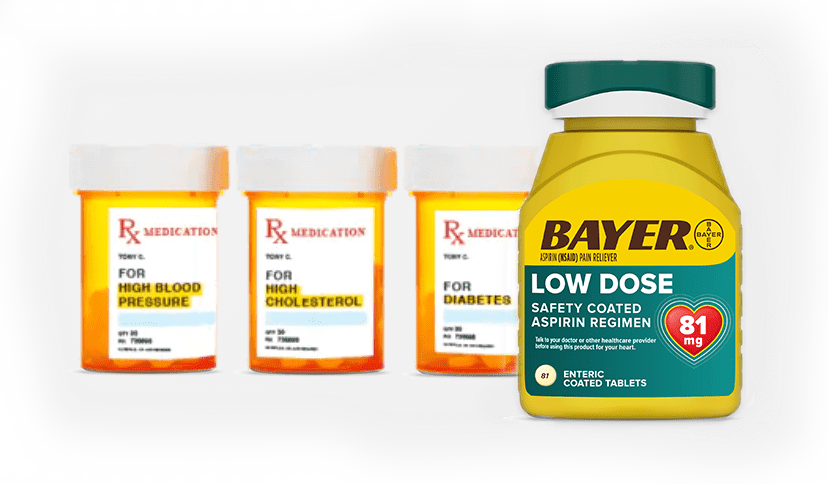WHAT IS A STROKE?
LEARN ABOUT THE MOST COMMON TYPE OF STROKE
Key Takeaways
87% OF STROKES ARE CLOT-RELATED (ISCHEMIC)
They happen when a blockage stops the flow of blood to your brain.
1 IN 4 ISCHEMIC STROKES HAPPEN AFTER A PRIOR STROKE.
That’s why managing your risks is so important.
ADDING AN ASPIRIN REGIMEN CAN HELP PREVENT ANOTHER CLOT-RELATED (ISCHEMIC) STROKE
When taken as directed by a doctor, aspirin can help lower your risk of another clot-related (ischemic) stroke by 22%.
Aspirin is not appropriate for everyone, so be sure to talk to your doctor before you begin an aspirin regimen.
Clot-related (ischemic) strokes are the most common type of stroke. Knowing what causes ischemic stroke helps you manage your risks.
What is an ischemic stroke?
Accounting for 87% of all cases, ischemic strokes occur when a blood vessel in the brain is blocked by something inside the blood vessel itself.
While the causes of ischemic stroke are blockages, there are two types of blockages, and as a result, two kinds of ischemic stroke. If the blockage results from the gradual build-up of fatty plaque deposits, it’s known as a thrombotic stroke. If the blockage is caused by a small blood clot or plaque fragment that formed elsewhere in the body and was then carried by the bloodstream to the brain until it lodged in a tiny vessel, it’s known as an embolic stroke. Talk to your doctor about the treatment most appropriate for you.
What are the risks?
Since ischemic strokes are caused by blockages in blood vessels, you may have already guessed that the risks for having a clot-related (ischemic) stroke are similar to a heart attack. In addition, there are some unique risk factors women should know about and manage.
If I’ve already had a clot-related (ischemic) stroke, how can I help prevent another one?
Having a clot-related stroke means you’re at a higher risk of having another one. The good news is that there are steps you can take to manage your risks, including a doctor-directed aspirin regimen.
Aspirin is not appropriate for everyone, so be sure to talk to your doctor before you begin an aspirin regimen.

MANAGING RISK:
WHY PRESCRIPTION MEDICATIONS
MAY NOT BE ENOUGH
If you take prescription medications for high blood pressure, high cholesterol, and diabetes, they may not be enough to protect your heart. Talk to your doctor about whether these medications are enough for you and whether adding an aspirin regimen can help further reduce the risk of another heart attack or clot-related (ischemic) stroke.
Aspirin is not appropriate for everyone, so be sure to talk to your doctor before you begin an aspirin regimen.
Aspirin regimen products for recurrent stroke prevention
Aspirin is not appropriate for everyone, so be sure to talk to your doctor before you begin an aspirin regimen.








